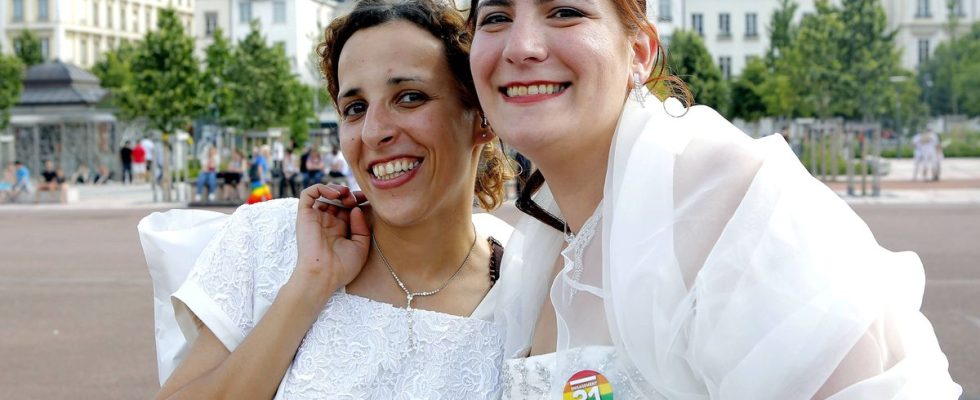Its passage into law was to develop “a juicy business” and promise to “pay off big”, headlined the press at the time. Wedding planners, jewelers and DJs, according to forecasts, professionals in the sector would take advantage of the adoption of the law of marriage for all to increase their business. What about ten years later? What place do LGBT+ celebrations occupy in this already very lucrative market?
3% of all marriages
The answer lies first in the numbers. According to regulars in the field, a wedding costs – depending on many criteria specific to each – between 15,000 and 40,000 euros. And 20% more for homosexual couples, who would have a higher budget, according to mon-mariage-gay.com, the queer equivalent of mariages.net. A hypothesis confirmed by Christelle Cosson, specialist in wedding cakes in the Lyon region. “These are often parties in smaller groups. The means devoted to other aspects of the event are therefore greater. »
Exit then the “toppers” which seem “kitsch” today. “Every year I equip myself with about ten figurines representing two men and two women, but I rarely use them. Brides-to-be always come up with their own idea. »
On the scale of her business, she has not noticed any difference since the law was passed. She develops: “About 10% of the orders are for weddings of the same kind. That’s about 4% of the benefits for local caterers from what they told me. So, indeed, it made it possible to have a new demand which did not exist because of the legislation, but it did not allow an explosion of the market in proportion to the other celebrations. »
Same observation on the side of wedding salons. In 2013, a few days after the adoption of the law, the first “G-day” was held in Paris, exclusively for unions between men. A first… Which did not have the expected success. “Not surprising”, for Philippe Steed, founder of the biggest organizer of wedding fairs, ID organization.
A specialist in the field for fifteen years, he finds it “stigmatising” to hold separate events, or even to have labeled stands. “If you put up a Rainbow flag – identified as the LGBT+ flag – it sends the wrong message and heterosexual couples think the show is not for them,” he says. Especially since the latter still represent the vast majority of visitors, even ten years after the law. According to Mariages.net, of the 244,000 unions made in 2022, 7,000 were of same-sex couples. This is on average, the same data every year for a decade.
Specialized service providers to avoid judgment
The salon expert concludes: “And then, when you look at marriage as a celebration, nothing changes. The service providers carry out the same missions. A DJ has to make people dance, a caterer has to provide food and a photographer has to convey emotions. »
Maybe. However, in reality, this is not always the case. “In 2019, during a wedding between two women, the DJ launched “but then when you are bi, do you marry three?” thinking of making a joke, remembers Sophie, still embarrassed. This is typically the kind of detail that LGBT+ couples don’t want to stumble upon. Sophie is part of the Sophie wedding planner team, which specializes in LGBT weddings “but not only”. From the start of her company, she exposed this “competence”, herself being part of the milieu, but without “the idea of making money thanks to that”, she underlines.
“When I launched my box, I was given a place on the pride float, I had the right to a stand at each event, she says. My work and my notoriety have really grown thanks to the community. But I didn’t want to lock myself in by dealing only with gay and lesbian couples. In the middle, we advocate the freedom of everyone, so I was not going to refuse clients because they were straight. »
Rewarded each year by Mariages.net, the expert quickly became “the benchmark” in France, with “almost no competition”. “We have about a hundred requests a year and we make about twenty,” she says. Among these twenty, four or five will be LGBT + when my counterparts will have one every four years. »
For Sophie, specializing is not a question of business, but of feelings. “Today, all the organizers take gay couples. And fortunately ! But when it’s someone from the community taking care of the best day of your life, yourselves LGBT+, it’s more believable. We know. We support each other. And then, you are sure that there will be no judgement. »
67% of new celebrants of secular ceremonies
But not all providers have to be LGBT+ to have a same-sex wedding, Sophie says. “And with the new demand, some are adapting,” she continues. A few years ago, a boutique in Lyon, originally specializing in men’s clothing, ended up integrating women’s suits after numerous requests from clients for their wedding. » Today, mon-mariage-gay.com has referenced 345 « gay-friendly » partners.
Finally, the only area that has really exploded since the vote is that of secular ceremonies. According to Mariages.net, marriage for all has led to “the growth of the officiating profession” with “67% of new professionals” recorded in one year.
The economic impact of the adoption of the law is not felt directly within the marriage market. But the opening of these rights to gay and lesbian couples still had, unconsciously, consequences on French economic growth. This is proven by the Open for business report, published in April 2020. The more a country has policies in favor of LGBT+ rights, the more it prospers. Conclusion ? Long live the brides!

